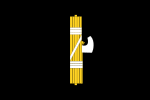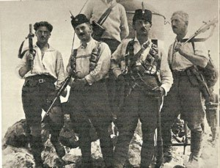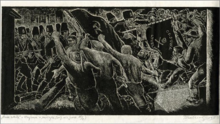- ORJUNA
-
Part of a series on Fascism  Core tenetsNationalism · Totalitarianism · Single party state · Dictatorship · Collectivism · Social Darwinism · Militarism · Mixed economy · Class collaboration · Third PositionTopicsWorksThe Doctrine of Fascism · Fascist manifesto · Mein Kampf · My Autobiography · The Myth of the Twentieth Century · Zaveshchanie russkogo fashistaInternational organizationsHistoryListsRelated topicsAnti-fascism · Clerical fascism · Fascist (epithet) · Glossary of Fascist Italy · Neo-Fascism · Racism · Social fascism · Palingenetic ultranationalism
Core tenetsNationalism · Totalitarianism · Single party state · Dictatorship · Collectivism · Social Darwinism · Militarism · Mixed economy · Class collaboration · Third PositionTopicsWorksThe Doctrine of Fascism · Fascist manifesto · Mein Kampf · My Autobiography · The Myth of the Twentieth Century · Zaveshchanie russkogo fashistaInternational organizationsHistoryListsRelated topicsAnti-fascism · Clerical fascism · Fascist (epithet) · Glossary of Fascist Italy · Neo-Fascism · Racism · Social fascism · Palingenetic ultranationalismFascism portal
Politics portalORJUNA, ОРЈУНА, the commonly used acronym for Organizacija Jugoslavenskih Nacionalista, Организација Југославенских Националиста (Organization of Yugoslav Nationalists), was a political organization during the 1920s in the Kingdom of Serbs, Croats and Slovenes. It was the foremost fascist movement in interwar Yugoslavia.[1] It supported Yugoslav nationalism, promoted the creation of a corporatist state, and attacked communism, democracy, Jews, separatists, Croatian nationalists, and Serbian nationalists.[2] It was particularly influential in areas of Slovenia and Croatia that were of interest to Italian and Austrian irredentism as well as in areas where ethnic minorities where viewed to be powerful or separatist, such as Hungarians in Vojvodina.[3] The membership of the movement was ethnically mixed of the various Yugoslav nationalities.[4] However most of its members were Croats from Dalmatia.[5] It ran its own newspapers, had an academic club, a labour organization, a high school students wing "Young Yugoslavia", and a paramilitary organization, the Action Section.[6] It was created in March 1921 in Split.[7] Its leader was Milan Pribićević.[8] by a fusion of pre-war youth organizations and was originally called Jugoslavenska Napredna Nacionalistička Omladina/Yugoslav Progressive Nationalist Youth. The first president was Marko Nani and the first secretary Edo Bulat. The first actions organized by JNNO were demonstrations against communists because of the communist assassination of the Minister of Interior Milorad Drašković. JNNO organized demonstrations in Split, Zagreb and Osijek. In Zagreb, JNNO members even demolished offices of newspapers that blamed the government for assassination.
Until 1922 people of all age groups started to join the organization, which changed its name in May 1922 to ORJUNA. ORJUNA's main political goal was maintaining a unitary Yugoslav state. Its members clashed with Austrian and Italian border patrols.[9] ORJUNA never participated directly in elections but its supporters voted for Yugoslav oriented parties. In 1929, when the King proclaimed his personal dictatorship and disbanded the parliament, ORJUNA supported the King's action, but because the King outlawed all political parties and organizations ORJUNA ceased to exist.
References
- ^ Cyprian Blamires. World fascism: a historical encyclopedia, Volume 1. Santa Barbara, California, USA: ABC-CLIO, Inc., 2006. Pp. 745.
- ^ Cyprian Blamires. World fascism: a historical encyclopedia, Volume 1. Santa Barbara, California, USA: ABC-CLIO, Inc., 2006. Pp. 745.
- ^ Cyprian Blamires. World fascism: a historical encyclopedia, Volume 1. Santa Barbara, California, USA: ABC-CLIO, Inc., 2006. Pp. 745.
- ^ Cyprian Blamires. World fascism: a historical encyclopedia, Volume 1. Santa Barbara, California, USA: ABC-CLIO, Inc., 2006. Pp. 745.
- ^ Peter F. Sugar. Native fascism in the successor states, 1918-1945. Santa Barbara, California, USA: ABC-CLIO, Inc., 1971. Pp. 137.
- ^ Cyprian Blamires. World fascism: a historical encyclopedia, Volume 1. Santa Barbara, California, USA: ABC-CLIO, Inc., 2006. Pp. 745.
- ^ Ivo Banač. The national question in Yugoslavia: origins, history, politics. Paperback edition. Ithaca, New York, USA: Cornell University Press, 1988. Pp. 187.
- ^ Ivo Banač. The national question in Yugoslavia: origins, history, politics. Paperback edition. Ithaca, New York, USA: Cornell University Press, 1988. Pp. 187.
- ^ Cyprian Blamires. World fascism: a historical encyclopedia, Volume 1. Santa Barbara, California, USA: ABC-CLIO, Inc., 2006. Pp. 745.
Categories:- Kingdom of Yugoslavia
- Political organizations
Wikimedia Foundation. 2010.



